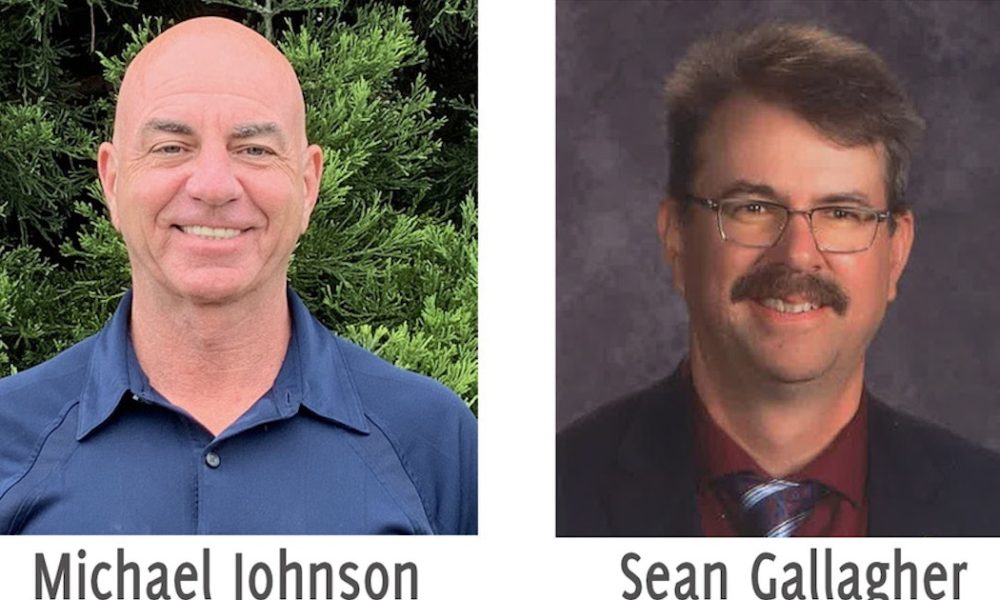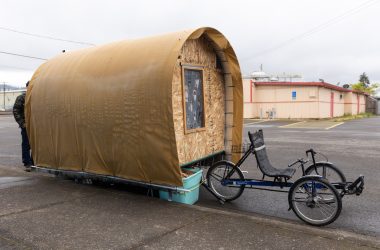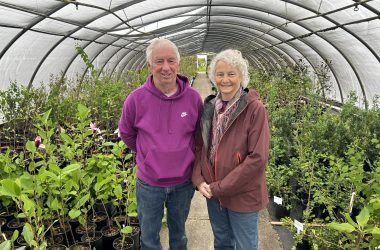 MICHAEL JOHNSON is the current principal at James Monroe Middle School in Eugene, Ore. He has 28 years of administrative experience at all levels of K-12 education. He has a master’s degree from Portland State University in Education; Policy, Foundation and Administration. He completed his administrative licensure program at Lewis and Clark College. SEAN GALLAGHER is the current superintendent at Brookings-Harbor School District in Brookings, Ore. He has 20 years of administrative experience in education, including 12 years as a superintendent in Brookings-Harbor and Lake County School Districts. He has a master’s degree in math education from Oregon State University, and he has completed his administrative licensure program at Lewis and Clark College. Photos provided
MICHAEL JOHNSON is the current principal at James Monroe Middle School in Eugene, Ore. He has 28 years of administrative experience at all levels of K-12 education. He has a master’s degree from Portland State University in Education; Policy, Foundation and Administration. He completed his administrative licensure program at Lewis and Clark College. SEAN GALLAGHER is the current superintendent at Brookings-Harbor School District in Brookings, Ore. He has 20 years of administrative experience in education, including 12 years as a superintendent in Brookings-Harbor and Lake County School Districts. He has a master’s degree in math education from Oregon State University, and he has completed his administrative licensure program at Lewis and Clark College. Photos provided
Editor’s note: Staff writer Aliya Hall spoke with both finalists for the Creswell School District superintendent position, Sean Gallagher and Michael Johnson. This is a recap of their questions and answers, edited for brevity.
Q: Which accomplishments are you most proud of in your previous employment?
MICHAEL JOHNSON: Student achievement and developing a professional learning community. Developing professional learning communities with a cohesive vision of success for all stakeholders is huge. Developing improvement plans with goals to increase student achievement and success; we’ve done that in our program really well. As we continue to grow, we reach higher levels of student success, and higher levels of achievement.
SEAN GALLAGHER: We’ve been building a lot of infrastructure, process procedures. We’re working on our third seismic retrofit project. We’ve added key staff positions, like certified librarian and different CTE programs. We’ve also built our dual credit program, and last year issued over 1,700 college credits to students — and this year will be more. Seniors graduating this year who have their first year of college paid for already. Our grad rate has increased substantially. For years our district had a graduation rate of lower 50 percentile and, for last year, we’re predicting 82 percent. Our CTE graduation rate has increased to 96.7 percent – that’s something i’m very proud of because it shows students understand what they’re learning. We’re on the verge of partnering with Southwestern Community College for joint use of a CTE facility, so they can be offering night courses for the community. At the elementary level, we strengthened reading levels and are seeing great academic scores coming from that. If you talk about graduation rate, it starts in kindergarten Those third-grade reading scores are important. We’ve brought a lot of stability to our middle school based on student behavior; we know middle school years can be challenging for students.
What are the first steps you’d take in the job?
JOHNSON: I would want to get established in the community and develop relationships with board members, district office personnel, administrators and staff. I want to make myself visible in the community; I’m a big community builder and that’s what I would focus on. I’d become familiar with district goals, budget and improvement plans, and looking at student achievement data. There’s also the climate and parent involvement in schools. I’d want to look at that to see how parents could get involved in supporting K-12 and maybe enrich the program.Visit the schools and classrooms to get to know administrators, teachers and especially the students. I think the presence there is important, and I need to be visible in those school so everyone can identify with me. I would like to meet every employee in the district; it’s a small district – I’m accustomed to that – and like to get their sense of what is going on. What do they love about the district and if there is something they could change what would it be.
GALLAGHER: A lot of listening and a lot of learning. Every school district is different, and i’m very attracted to Creswell. I think it’s a great community and rural environment. It’s the size of a school district I’m used to managing and leading, but there’s always uniqueness to every school district and it’s important to do a lot of listening and a lot of building those teams with having a new superintendent. Especially after Todd Hamilton who’s been there for eight years – it’s a change. They need to learn who I am, I need to learn who they are and learn the culture. I need to learn what their passions are and what they want to accomplish, what their goals are and the community’s goals are, and most of all what the goals of the students are. What do they see as challenges or desires, or programs that are running they want to keep running. Put together a 100-day introduction plan and learn more about the district as well as the community. I want to meet with local leaders, school board members, business people, people who have invested in seeing Creswell thrive and grow, and ensure that we’re doing the best we can for our students.
What did you know about this school district before seeking the job? What drew you to Creswell?
JOHNSON: My goal is to be the superintendent of that district. Creswell is a good fit for me. I will do what’s in the best interest of the kids and the community. The district has a long history of student achievement and for as long as I’ve known of it, it’s been a destination district for students, families, teachers and administrators. I view Creswell as a destination for my career; it feels like coming home to me because I’ve spent nearly half my career in small districts and I miss the closeness of a small community. I was speaking about the association with people that I’ve had there and I’m very familiar with Creswell’s community values and expectation for an excellent education. When I saw the advertisement for the position, I immediately prepared my application. I want to be the superintendent of that district and being a member of that community, and being able to grow with that district and community is appealing to me. Things I admire of the district that I’ve known to be true, the community has a reputation of fully supporting the district and schools. The high expectation and high levels of student achievement and success there fits together with my expectations. The district is known for collaboration and shared leadership. I know they manage their operations exceptionally well and are financially stable, but the staffing is stable. I like the teaching conditions and class sizes; they’ve done really well to have excellent class sizes there.
GALLAGHER: My daughter and her husband have settled in Cottage Grove, and my wife and I have identified that area as a place we’d like to be closer to. I had a chance to stay in the RV park and eat at local restaurants, and I fell in love with the area. I’m an old Montana boy and I like rural settings. Also, through my connection with Todd (Hamilton). Todd and I taught at Hermiston years ago and kept track of each other. I’m very appreciative of things he’s accomplished. (Creswell is) very attractive to me. I know the music program is real strong there and other programs I want to learn more about. It seems like a good fit for me and I hope Creswell feels the same about me.
How active do you plan to be in the community? Would you move to Creswell or commute?
JOHNSON: I would want to be involved in the community at every level possible. I’d want to get involved in community organizations and get to know community members on an informal basis. So setting up things like superintendent coffees once a month where community members can come and chat about what’s happening in schools … and communicate my vision of the district. At every opportunity I would want to do that. I would fully commit myself to the school board’s goals and vision for the district. Just be visible at school activities, community events, community forums. I would want to make myself available for community members at every opportunity. I’ve been associated with the Creswell district for 30 years; teachers, coaches and community members in high school, and to this day familiar with the community. There was a time I wanted to live in Creswell and commute to Eugene. Living in Creswell, I would love to do that.
GALLAGHER: I’ve always lived in the community that I’ve been an administrator in. It’s important to be part of the community that you’re an administrator in. Community is important to me. I want people to see me walking down the street, mowing my lawn, going to the store or community event. I’m a long-term Rotarian, and would continue on with service organizations. I’m a very active member of our local church, happen to be worship leader at my local church. A longtime performing musician, I would want to explore something in the musical world also. I’ve served on economic development boards and community college advisory boards. I think exposure, openness and availability through the community is wildly important. I want people to know I’m accessible.
Could you tell me about the biggest mistake that helped you grow in your career?
JOHNSON: I don’t dwell on mistakes. I’m optimistic and positive. I look for the high road and see challenges as opportunities to grow. I don’t really harbor those. I don’t know if it’s been mistakes; it’s always been challenges that have led to opportunities that have led to my growth. I don’t think this is a mistake, but I’ve always felt that I’m a small community person and educator, and always been told that moving from teacher to advisory roles can give more opportunities to influence student growth. I went from a classroom to being an administrator and have been in large and small districts. I’ve been in a large district and learned a lot of strategies to provide a successful program for students and build community. Taking those skills to a small district and enhancing what’s already going on at Creswell, I want to be able to do my part and take things to another level. It’s not a mistake to be in a large district, but it feels more comfortable for me to be in a small district and community.
GALLAGHER: When I was principal at Madras High School, I was the youngest principal they ever had; I was 33 years old. I happened to graduate from Madras, and when I became principal I was suddenly supervisor of teachers I had as a student. It’s a really unique relationship, a special bond. We had the forestry department there that wanted to do some landscape improvements between a couple wings in the school. They submitted plans and it looked great, the area between the two wings was a weed patch. What I didn’t realize was those trees were planted by special education students years before, and I didn’t know that. I should have reached out more and learned more about what was in the weed patch. There was definitely ownership of that. When the forestry students showed up to clean things out, we had a lot of upset staff. I stopped it, and so it taught me very young in my career: before you step into something big, you want to do your litmus test. You want to make sure you’ve checked with others who have been there for awhile who understand what the culture is. We ended up not cutting down the trees.
What is your strategy for communication, both internally and externally? What communication methods would you use between the district and the community?
JOHNSON: I’m a community builder … and would like to build a community with a sense of purpose and common cause, where work has meaning and life is significant for everyone. My goal is to establish and engage working relationships with community, staff, families, elected leaders and other stakeholders. At all times, communicate vision of the district with (these individuals) by newsletter, emails, community forums and being accessible and approachable at community and school events. Be the ambassador of the schools and promote what we’re doing. Being visible in the schools for teachers and students; their relationships are important to me.
GALLAGHER: I think the district website is priority number one. It’s a go-to site for people to get information and I would make sure I had a presence on that website. I also have a Facebook page that we maintain, so we’re reaching out on social media. I have a Twitter account; I tweet. I think that’s another forum people are attracted to. I also have a key communicator group where anyone can subscribe or unsubscribe by email, and any time we send out a press release or anything official, we always send it to key communicators. That way they know what we’re communicating and what’s going on at the schools. I’ve also been known for fireside chats, sometimes we’ll feed people and I’ll do a presentation with discussion time. Just another way to disseminate information. I speak at a lot of events and meetings and, of course, press releases. I have not fiddled with video blogs, but often thought that would be something interesting to explore.
What do you think is a major challenge facing CSD and how do you plan to address it?
JOHNSON: It’s a very complex profession, and I think there are challenges facing all districts, and I don’t think Creswell is immune to those. The first challenge is adequate funding for a quality education model. What I found to be especially challenging in the schools I’ve taught in is to help develop every student to their full potential. But providing a program to develop and help the whole child is a challenge because of the resources. It can be done; I’ve done it. Family engagement is another challenge and we have to work harder to get families and parents involved in assisting or supporting the program and getting involved in schools. They’re essential to success; that has to be a point of improvement for any school in any district. Graduation rates, Creswell is doing exceptionally well, but maintaining and increasing that. It’s also about preparing every student for post-secondary experiences. We would look at how we could expand alternative education to all levels of our students. We have students who are not getting it and we need to look at our data about who is getting it and who isn’t so we can provide support to those who are missing it. Educating the whole child, we need full engagement of our students. Students have other areas of their education that need to develop, and make sure every child has an opportunity.
GALLAGHER: I don’t have enough information at this point to definitively say ‘Here are the major issues.’ That’s what I want to learn more about.
What is the role of the superintendent and board of education in curriculum development and innovation?
JOHNSON: The standards are constantly changing and we need to oversee our programs to make sure we’re aligned to the standards to prepare students for the world after school. Student achievement levels are absolutely critical, keeping students at a pace where they are working toward graduation and life that comes after. As a school board and superintendent we have fiscal responsibilities that we have to tend to. As educational leaders we have to look at what we’re teaching, the substance of it and are we teaching kids what they need to learn and be able to do at every level. Are we implementing the absolute best practices for instruction? What’s most important for student achievement is what’s happening in classroom. We’ve got to give teachers the tools to reach every student. We really need to focus on using best practices for instruction in order to graduate every kid fully prepared for postsecondary experiences.
GALLAGHER: The role of superintendent is to utilize the staff in coming up with a recommendation for curriculum that best meets state and federal standards, as well as local interest needs and ability needs of the students. Different schools have different cultures, and different sets of students that learn slightly differently. We always want to make sure you’re matching your curriculum to the best needs of the school district. The role of the school board is to approve that recommendation and oversee it in terms of checks and balances. It’s a sizeable investment to adopt a curriculum and you want to spend that money wisely. You want to make sure you’re giving teachers the resources they need to teach their classrooms effectively and efficiently. At Brookings, they had adopted K-8 curriculum, but the high school was writing not only the lesson plan, but the curriculum. That’s a little too much. Curriculum is extremely important; it’s the essence of what we do.








